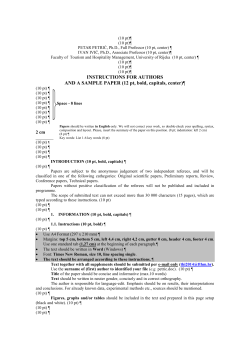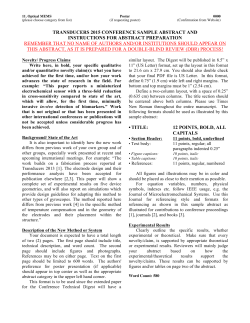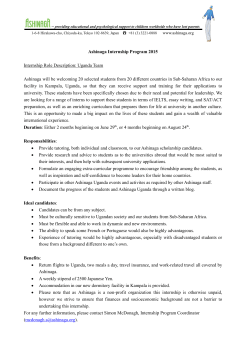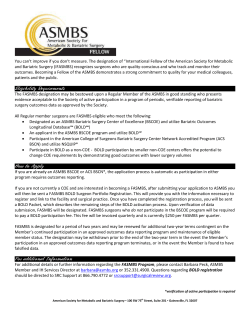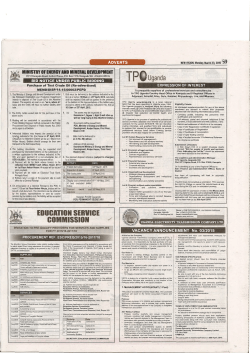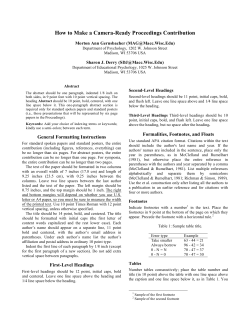
BOLD_Newsletter_Issue1_2015 - BOLD â Better Outcomes in
BOLD Project Newsletter Issue 1 | January 2015 INTRODUCTION Purpose of BOLD The Department of Reproductive Health and Research, World Health Organization, has initiated a project entitled “Better Outcomes in Labour Difficulty” (BOLD) to accelerate the reduction of intrapartum-related maternal, fetal and newborn mortality and morbidity by addressing the weaknesses in the process of labour care and bridging the disconnect between the health systems and the communities in low resource settings. This project, funded by the Bill & Melinda Gates Foundation, seeks to achieve this goal through a two-pronged approach: (1) by developing a Simplified, Effective, Labour Monitoringto-Action tool (SELMA) that will assist health providers to monitor labour and take decisive actions more efficiently; and (2) by developing innovative tools (“Passport to Safer Birth”), designed together with women, communities and health care providers, to promote access to respectful, quality care for pregnant women at the time of delivery. What is SELMA? interventions and respectful care can play an important role in increasing the coverage of quality care interventions, the concept of the Passport to Safer Birth has been developed. The Passport to Safer Birth will be an innovative tool designed together with women, communities and healthcare providers to promote access to and awareness of respectful, quality care for women and their companions at the time of delivery. The development of the Passport to Safer Birth will be an iterative process comprised of two activities: primary qualitative research and service design. The primary qualitative research will explore providers and health systems barriers and enablers to the provision of high quality monitoring and delivery of timely, safe and effective interventions during labour, as well as explore the needs and expectations of women and healthcare providers related to improving the quality of intrapartum care, including birth experiences and outcomes. The service design component What is the Passport to Safer Birth? will use innovative methods to explore and understand the Women in many settings still prefer to deliver at home due to experiences and preferences of the community, women and concerns about the quality of care available in the healthcare providers towards the development of tools to health facility. Considering that the demand for effective improve facility-based labour and delivery care. Labour complications are an important cause of mortality, morbidity and long-term disabilities for both mothers and babies, particularly in low-resource settings. Given the current challenges with labour monitoring and decision-support during labour and childbirth, a simplified, effective, labour monitoring-to-action (SELMA) tool will be developed. To do so, a prospective cohort study will be conducted in eight health facilities in total: four in Nigeria and four in Uganda. Data will be collected prospectively by a team of trained research nurses and midwives at the participating health facilities. After data collection is complete, prediction models will be developed to identify women at risk of an adverse intrapartum outcome throughout labour. These prediction models will be used to assemble a decision-support tool that can identify the best course of action to avert poor labour outcomes. 1/5 BOLD Project Newsletter Issue 1 | January 2015 BOLD NEWS SELMA and BOLD Formative training workshops in Abuja and Kampala Last fall, the BOLD team conducted concurrent training workshops for both the SELMA and BOLD Formative teams in Kampala (30-31 October 2014) and Abuja (3-4 November 2014). The SELMA-Uganda team was led by Kidza Mugerwa (Makerere University), João Paulo Souza (University of São Paulo), and Femi Oladapo (WHO), who trained 32 midwives, nurses and doctors as study site coordinators and data collectors. The BOLD Formative-Uganda team was led by David Kyaddondo (Makerere University) and Meghan Bohren (WHO), who trained sixteen research assistants from Makerere University as qualitative interviewers and focus group discussion moderators to conduct the BOLD formative research. The SELMA-Nigeria team was led by Bukola Fawole (University of Ibadan), João Paulo Souza, and Femi Oladapo, who trained 25 midwives, nurses and doctors as study site coordinators and data collectors. The BOLD FormativeNigeria team was led by Lanre Olutayo (University of Ibadan), Musibao Titiloye (University of Ibadan), and Meghan Bohren, who trained nine research assistants from the University of Ibadan and the Federal Capital Territory Primary Health Care Development Board (FCT-PHCDB) as qualitative interviewers and focus group discussion moderators to conduct the BOLD formative research. In addition to meeting our fantastic team of researchers in both countries, a highlight of the training workshop in Nigeria was a friendly competition between study sites as to which hospital was the best “centre of excellence”! BOLD Technical Advisory Group Meeting Design Research field trip Uganda On 13-14 November 2014, the second meeting of the BOLD Technical Advisory Group took place in Geneva, Switzerland. The Technical Advisory Group is comprised of researchers, social scientists, healthcare providers, service designers, statisticians and donors from over 15 countries. The first day of the meeting focused on SELMA, where Femi Oladapo and João Paulo Souza presented the study protocol, including detailed data collection and management, and establishing negotiated standards of care. Bukola Fawole and Kidza Mugerwa introduced the study sites in Nigeria and Uganda. Domingos Alves and Gleici Perdoná (University of São Paulo) outlined the plans for analysis, which include dynamic predictive modelling, survival analysis and logistic regression. The second day of the meeting focused on the Passport to Safer Birth, where Meghan Bohren presented the study protocol and qualitative research design and plan for analysis. Melanie Wendland (M4ID) enlightened the group about the concept of service design and outlined the BOLD service design process. Susan Munabi-Babigumira (Norwegian Knowledge Center for the Health Services), Priya Agrawal (Merck for Mothers), and Justus Hofmeyr (Effective Care Research Unit, South Africa) updated the group on their research projects related to BOLD activities. 2/5 The service design research team of M4ID visitied Uganda from 24 November to 5 December 2014 to conduct the design research activities for the the Passport to Safer Birth objective. The team spent one week in and around Kampala, visiting the communities of Namasubapiida and Maganjo B as well as Mulago Hospital and Nsambya Hospital to conduct interviews and observation and group discussions with women, men, health facility staff and community health workers. The second week was spent in and around Bududa hospital visiting communities, the local health centre and Bududa hospital. Analysing and mapping insights after design research All interviews andgroup discussions have been translated and transcribed and the team is currently working on analysing and synthesizing the insights, identifying themes and first ideas and opportunities. The insights will be updated and informed by the design research visit to Nigeria later this spring. BOLD Project Newsletter Issue 1 | January 2015 PROJECT UPDATES SELMA updates Nigeria Four sites were selected to participate in SELMA in Nigeria: Asokoro District Hospital in Abuja, Maitama District Hospital in Abuja, Wuse General Hospital in Abuja, and Mother and Child Hospital in Akure. Recruitment of participants commenced at Mother and Child Hospital on 15 December 2014 and over 100 participants have been recruited at this site as of 27 January 2015. Commencement of recruitment at the three Abuja sites has been put on hold due to an ongoing industrial action within the health sector; however, recruitment will start at these hospitals as soon as the dispute is resolved. Data entry into the online database is ongoing. Uganda Four sites were selected to participate in SELMA in Uganda, all of which are in Kampala: Mulago National Referral Hospital, St. Francis Hospital Nsambya, Mengo Hospital and Lubaga Hospital. Recruitment commenced at all four sites in the first week of December, and over 1400 women have been recruited from these sites as of 27 January 2015. Data entry into the online database is ongoing. Brazil Since October 2014, the BOLD-Brazil team has been busy developing the data collection and management system for BOLD using RedCap, which is a friendly, intuitive, secure and easily accessible platform. The BOLD-Brazil team developed the user manual of operations, where users can rapidly access any information about RedCap, such as how to create, edit and find a form. Then, the team developed the BOLD Data Management Plan, which includes an automatic check of all data through the Data Quality tool, whereby it is possible to verify values out of the normal limits/range and other logics inconsistencies. As data entry began, a member from our team has compared data from scanned records to Redcap electronic forms to check for inconsistencies. Once all checks are done, data entry reports are generated and shared with the local bases in Uganda and Nigeria for data correction. As of 27 January 2015, we have a total of 1,265 records in the system. From these records, 882 women (75 Nigeria, 807 Uganda) are eligible and agreed to participate. 3/5 BOLD Project Newsletter Issue 1 | January 2015 PROJECT UPDATES Passport to Safer Birth Updates Nigeria formative research As of 27 January 2015, the BOLD Formative-Nigeria team has conducted, transcribed and translated a total of 15 in-depth interviews (IDIs) and 1 focus group discussion (FGD). This includes: 6 IDIs with health administrators, 3 IDIs with doctors, 3 IDIs with nurses/midwives, 3 IDIs with women, and 1 FGD with nurses/midwives. The team is led by Professor Lanre Olutayo and Mr. Musibau Titiloye of University of Ibadan, and has divided into two groups: one team to cover the Akure sites and one team to cover the Abuja sites. Uganda formative research As of 27 January 2015, the BOLD Formative-Uganda team has conducted, transcribed and translated a total of 10 IDIs and 5 FGDs. This includes: 2 IDIs with health administrators, 2 IDIs with doctors, 3 IDIs with nurses/midwives 3 IDIs with women, and 5 FGDs with nurses/midwives. The team is led by Dr. David Kyaddondo of Makerere University. Service design The design team of M4ID is currently planning the co-design visit in Kampala at the end of February where participants of different segments (pregnant women, men, midwives) will collaborate in a workshop setting to create ideas for solutions to the identified key themes of the design research. At the same time the team is planning the design research visit to Nigeria estimated to take place in March. RECENT BOLD ACTIVITIES • • • 4/5 SELMA protocol final WHO ethics approval received: 24/11/2014 BOLD formative protocol final WHO ethics approval received: 8/10/2014 SELMA-Uganda training workshop, Kampala & BOLD formative-Uganda training workshop, Kampala: 30-31/10/2014 • • • • SELMA-Nigeria training workshop, Abuja & BOLD formative-Nigeria training workshop Abuja: 3-4/11/2014 BOLD Technical Advisory Meeting, Geneva: 13-14/11/2014 Uganda initial design research trip: 22/11 - 5/12/2014 Site visit to Uganda health facilities – 26 January 2015 BOLD Project Newsletter Issue 1 | January 2015 MEET THE BOLD TEAM Dr. Bukola Fawole, BOLD Principal Investigator - Nigeria Dr. Fawole is a Senior Lecturer/Consultant Obstetrician & Gynaecologist at the Department of Obstetrics & Gynaecology, College of Medicine, University of Ibadan/University College Hospital, Ibadan. Why were you interested in BOLD? “The BOLD project aims to find a solution to a major public health concern in my country namely the reduction of adverse pregnancy outcomes for both mother and the newborn. Findings from WHO Global Survey (conducted in 2005) and WHO Multi-country Survey (conducted in 2011) revealed that there was virtually no change in perinatal mortality rates in Nigeria during this period. Nigeria continues to rank among the countries with the highest perinatal mortality rates. High fresh stillbirth rates reflect poor quality of intra-partum monitoring; an alarming proportion of fresh stillbirths were normal weight term fetuses. Given these poor indices, it is a privilege to collaborate in the BOLD initiative that hopefully will turn the page and lead to improved intra-partum monitoring and better outcomes for mothers and their newborns.” This newsletter is designed for all those involved or interested in the BOLD project. We hope that this publication will keep you up-to-date on current and upcoming activities, accomplishments by the team, and important project changes. The newsletter will be distributed bi-monthly, with the next issue scheduled for the first week of April. We welcome submissions of project updates by any team member for inclusion in the newsletter. Please submit material by 25 March 2015 to Meghan Bohren (bohrenm@who.int) for the next newsletter. BOLD study sites: Visit us on the web at www.boldinnovation.org Thank you to all BOLD members for contributing content. Project partners 5/5 Maitama District Hospital, Abuja, Nigeria (Dr. Frank E. ALU) Asokoro District Hospital, Abuja, Nigeria (Dr. Amos A. ADEBAYO) Wuse General Hospital, Abuja, Nigeria (Dr. Olubunmi Abraham ALABI) Mother and Child Hospital, Akure, Nigeria (Dr. Adesina AKINTAN) Mulago Hospital, Kampala, Uganda (Dr Josaphat Byamugisha & Dr Miriam Nakalembe) St. Francis Hospital Nsambya, Kampala, Uganda (Dr Othiniel Musana) Mengo Hospital, Kampala, Uganda (Dr Michael Bukenya) Lubaga Hospital, Kampala, Uganda (Dr Salim Bataale)
© Copyright 2025
